Key takeaways:
- Choosing organic foods reduces chemical exposure and supports sustainable farming practices.
- Organic ingredients enhance flavor and texture, inspiring creativity in cooking.
- Seasonality and freshness are crucial in selecting organic produce, elevating meal quality.
- Personal experiences and health concerns motivate a commitment to organic foods for both individual well-being and environmental impact.
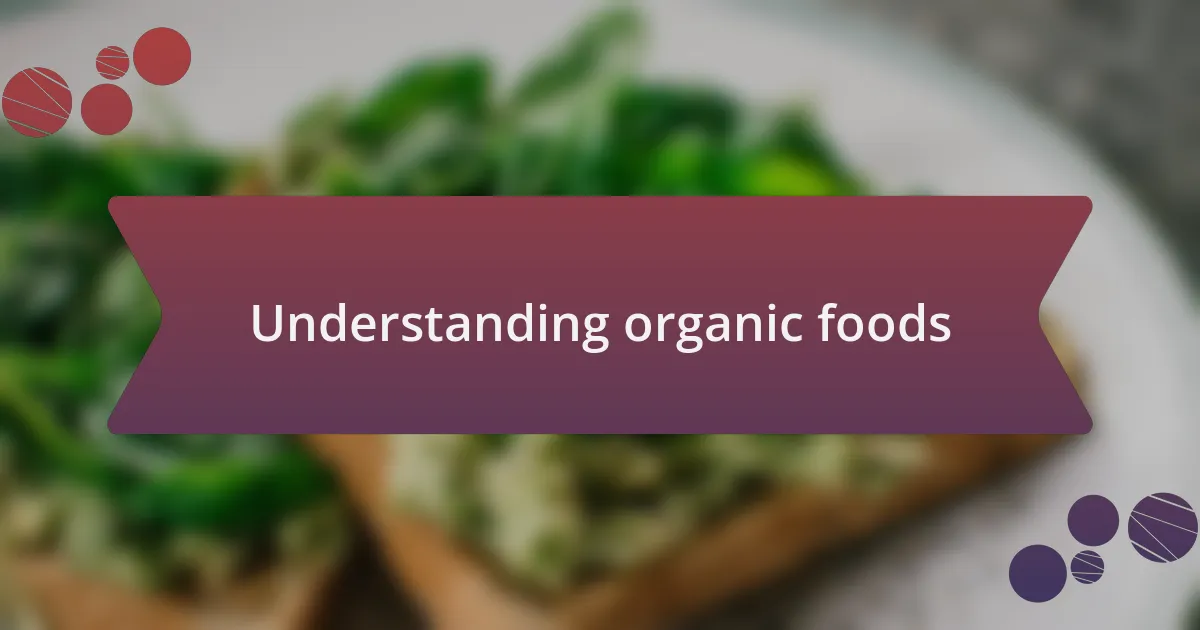
Understanding organic foods
Understanding organic foods goes beyond just a label found in the grocery store. When I first started buying organic, I noticed the difference not only in flavor but also in my overall well-being. Have you ever bitten into an organic tomato and felt that burst of fresh, natural sweetness? It’s as if those fruits and vegetables have a story to tell, revealing their vibrant past.
Organic foods are grown without the use of synthetic pesticides and fertilizers, which really resonates with me. I remember reading about how conventional farming can harm local ecosystems, and I felt a pull to support practices that were more in harmony with nature. It made me reflect—what kind of impact do I want my food choices to have on the planet and my health?
There’s something truly rewarding about choosing organic; the thought that every purchase supports sustainable agriculture feels empowering. I recall walking through an organic farmers market, surrounded by colorful produce and friendly farmers who share their passion for healthy living. Don’t you think it’s nice to connect with the origins of our food and understand what goes into our meals?
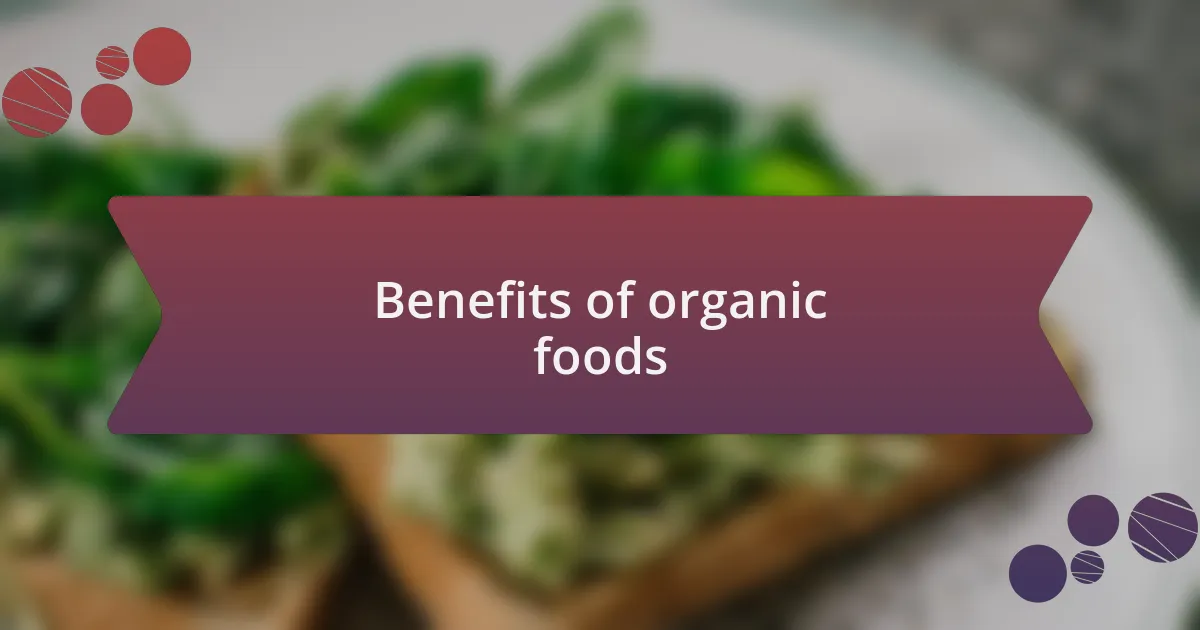
Benefits of organic foods
Choosing organic foods brings a multitude of benefits that often extend beyond just my plate. One of the key advantages I’ve noticed is the reduction in chemical exposure. I still remember the first time I switched to organic apples; the peace of mind knowing I was eating fruit free from harmful pesticides felt liberating. It’s a small but significant shift that allows me to feel more connected to my health.
Additionally, organic farming practices promote biodiversity, which is not just good for the environment, but also for our diets. I often think about the variety of fruits and vegetables that come from organic farms, which inspires me to experiment with new recipes. When I incorporate these diverse ingredients into my cooking, I feel like I’m not just nourishing my body but also delighting my taste buds in ways I hadn’t considered before. Isn’t it exciting to explore flavors that reflect the richness of nature?
Lastly, supporting organic farming helps local economies thrive. I vividly recall visiting an organic farm where I got to pick my own veggies. It fostered a sense of community and connection, knowing that my choices directly supported hard-working farmers. When I make a conscious decision to buy organic, I feel empowered, reinforcing the idea that my food choices can make a difference, not just in my life, but in the lives of others as well. How can we not feel inspired by the idea that our meals can create a ripple effect of positive change?
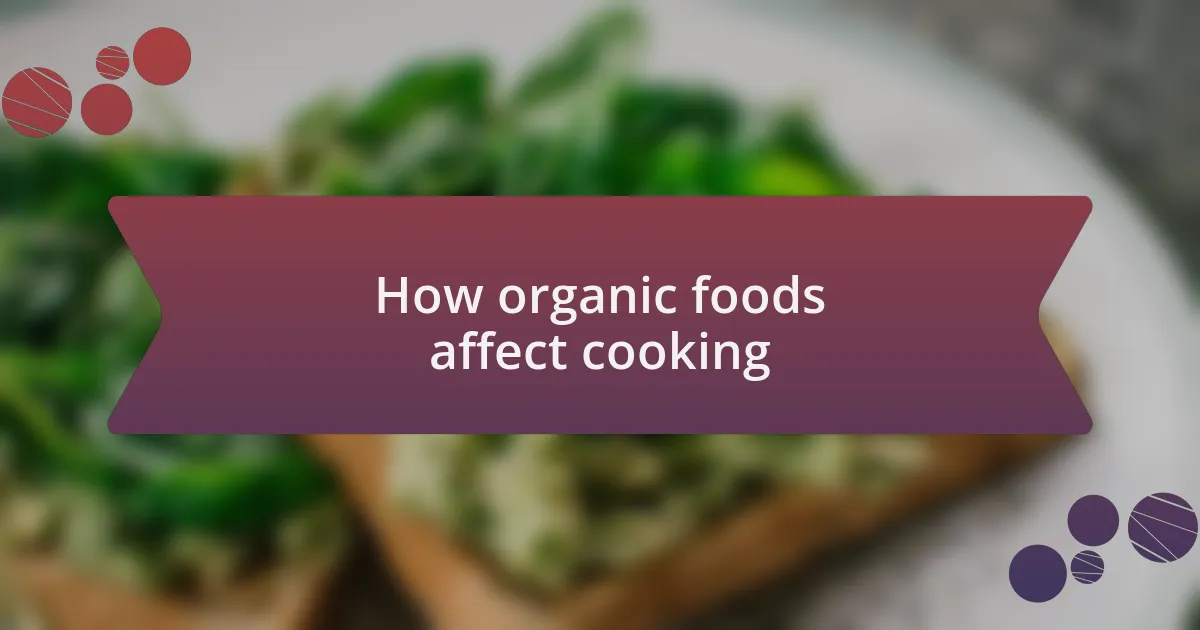
How organic foods affect cooking
When I cook with organic ingredients, I often notice a significant boost in flavor. The first time I made a salad using organic tomatoes, I was struck by their vibrant taste—so much more robust than the conventional ones I had used before. It felt like a celebration of fresh, unadulterated flavors that simply enhanced every dish.
I also find that organic foods tend to have a unique texture that transforms cooking. For instance, when I made a stew with organic carrots, their crunch retained even after simmering. It’s these little details that elevate my cooking experience; I am not merely following a recipe but engaging in a symphony of tastes and textures that feels deeply satisfying.
Moreover, organic foods inspire me to be more creative in the kitchen. I often find myself trying new cooking methods or experimenting with unfamiliar vegetables that I pick up at the local farmer’s market. Does anyone else feel that spark of inspiration when they see an unusual ingredient? This sense of adventure keeps my cooking fresh and exciting, transforming meal prep into an enjoyable exploration rather than a mundane task.
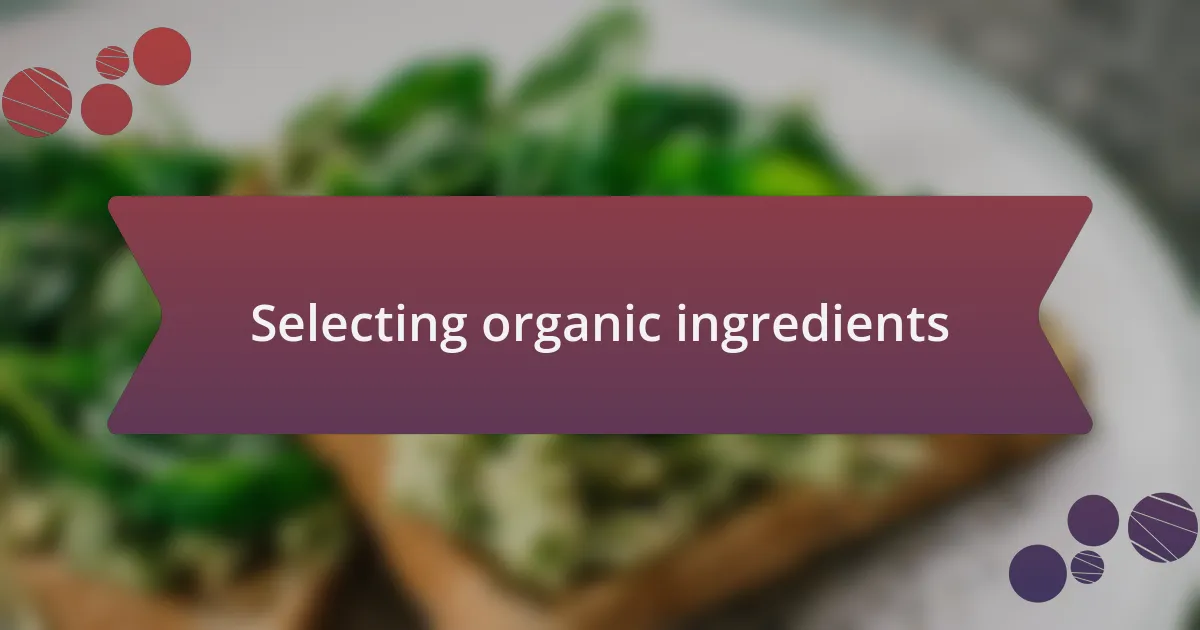
Selecting organic ingredients
Selecting organic ingredients can be quite the journey in itself. I recall my first visit to a local organic market—stepping in felt like entering a treasure trove. Each stand was brimming with produce that looked alive and inviting. I often ask myself, how can I unlock these vibrant flavors in my dishes? It turns out, the key lies in choosing the freshest organic ingredients available.
I pay attention to labels and certifications when selecting organic items. For example, I recently discovered the difference between “100% organic” and simply “organic.” Understanding these terms has profoundly impacted my shopping choices, ensuring I’m selecting the best for my meals. Have you ever considered how such details might affect your cooking? I’ve found that the integrity of the food I use directly influences not just health, but also the joy I experience in preparing my meals.
Seasonality is another important factor that shapes my selection process. I’ve learned that ingredients like organic asparagus taste best in their peak autumn harvest. I remember preparing a spring risotto with fresh organic asparagus sourced from a nearby farm, and the flavor was undeniably distinct. This intentionality in choosing seasonal organic produce makes every bite feel like a celebration of nature’s bounty. What seasonal ingredients excite you in your cooking adventures?

Favorite organic recipes
When I think of my favorite organic recipes, the first that comes to mind is a vibrant organic quinoa salad. I toss together fresh cherry tomatoes, cucumbers, and herbs harvested from my own garden. There’s something truly satisfying about taking a bite and tasting the distinct flavors of ingredients that are free from pesticides. Have you ever experienced the joy of gardening? It deepens my appreciation for each meal I prepare.
Another go-to recipe is my homemade organic tomato sauce. I remember the first time I used organically grown tomatoes—sweet, juicy, and bursting with flavor. Simmering them with fragrant garlic and fresh basil fills my kitchen with a comforting aroma. What’s remarkable is how simple ingredients can transform a dish so completely. I often wonder, has there ever been a meal that reminded you of home?
One of my absolute favorites during the colder months is a hearty organic vegetable soup. There’s something magical about slow-cooking a medley of root vegetables; the scent alone warms my heart on a chilly day. I find myself sneaking tastes right from the pot, marveling at how the natural sweetness of organic carrots can elevate even the simplest broth. Do you have a recipe that feels like a warm hug on a cold day? For me, this soup is that comfort in a bowl.
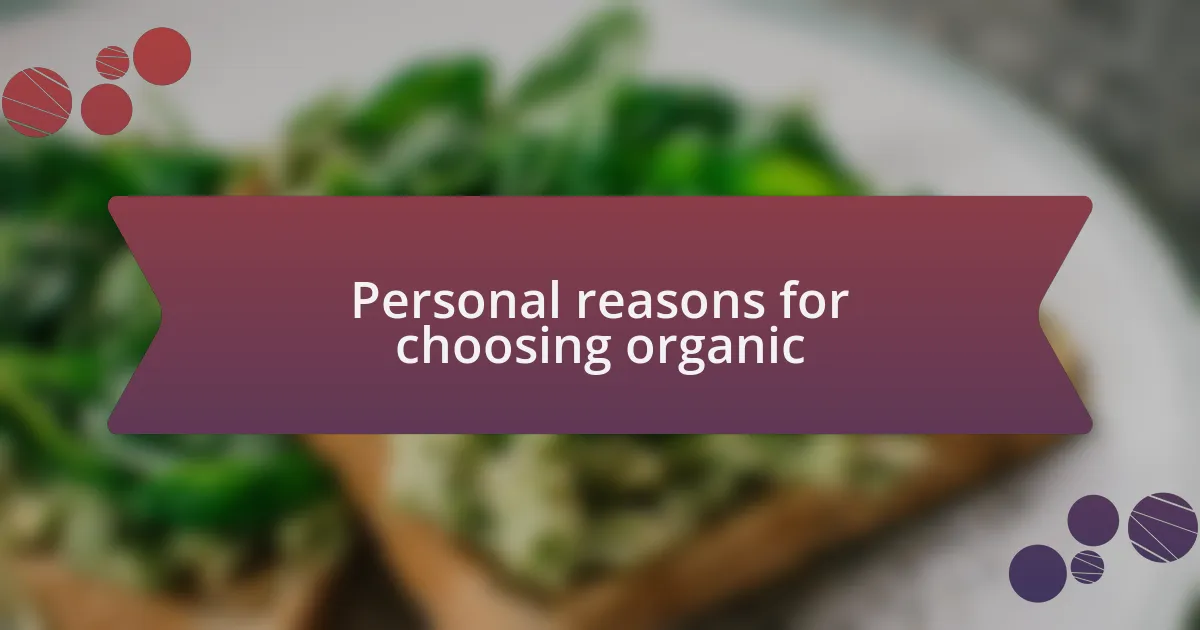
Personal reasons for choosing organic
When I first decided to switch to organic foods, it felt like a small step towards a healthier lifestyle. I vividly remember the first time I purchased organic apples; biting into one, I was struck by how crisp and flavorful it was compared to conventional ones. Since then, I’ve made it a point to prioritize organic produce, not just for my health but for the planet as well.
A personal experience that solidified my choice happened during a meal with friends. We cooked an entirely organic dinner together, sourcing all our ingredients from a local farmer’s market. Watching everyone enjoy the meal and discussing the source of our food made me realize how connected I felt to the people and the earth. In that moment, I pondered, how often do we truly consider where our food comes from?
One of my ongoing reasons for choosing organic is my family’s health. A few years back, my daughter had a mild allergic reaction to something in our food. After doing some research, I was astonished to learn how many chemicals are used in conventional farming. That revelation pushed me to fully embrace organic options, ensuring that what I serve my family is free from harmful additives. I’ve found that knowing exactly what goes into our meals provides peace of mind. Isn’t it comforting to know that we can make choices that contribute to our well-being?